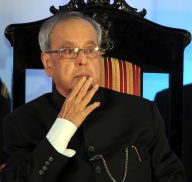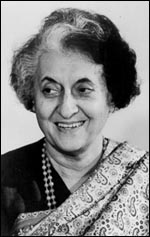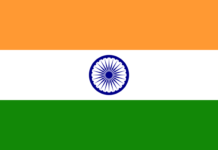NEW DELHI– Indira Gandhi knew her life was at risk when she decided to go for militarily storm the Golden Temple, President Pranab Mukherjee reveals in the second part of his memoirs released on Thursday.
“The Turbulent Years, 1980-1996” (Rupa) says that “criminals, smugglers and anti-social elements” had joined the Khalistan movement and recalls that the Golden Temple had become a safe haven for them.

The president writes that talks with the Akali Dal failed due to its rigid stance, and last ditch efforts were made shortly before “Operation Blue Star” – as the military operation was codenamed – was launched.
“Even a few days before Operation Blue Star, an attempt was made to find a solution by holding a meeting with the Akali Dal leaders who were brought from jail to the lounge of the Chandigarh airport at midnight.
“P.V. Narasimha Rao, Cabinet Secretary Krishnaswamy Rao Sahib and I represented the government in that meeting. Unfortunately, the talks remained unsuccessful,” he says in the book released at the Rashtrapati Bhavan by Vice President M. Hamid Ansari.
“By May 1984, it became increasingly clear that there was no alternative but military action to flush out the terrorists within the Golden Temple, particularly as the negotiations and discussions had not yielded the desired results.”
The decision to storm the Golden Temple was taken at a meeting of the Cabinet Committee on Political Affairs (CCPA) but no official was present at the meet, Mukherjee writes.
Operation Blue Star was launched at the Golden Temple on June 3, 1984, with the army entering the premises.
Mukherjee then writes how Gandhi told him she was aware of the threat to her life.
“I still vividly recall Mrs Gandhi telling me, ‘Pranab, I know of the consequences.’ She understood the situation well and was clear that there was no other option.
“Aware that her own life was at risk, she took a conscious decision to go ahead in the best interest of the nation.”
Mukherjee defends the operation, calling the situation in Punjab at that time “abnormal”.
“It is easy to say that the military action could have been avoided. However, nobody really knows if any other option would have worked. Such decisions are always taken based on the conditions prevailing at that time. The situation in Punjab was abnormal.”
He adds that the “biggest tragedy” of the whole event was the “loss of Mrs Gandhi”.
“Her last speech in Orissa, two days before her assassination, was prophetic. She said, ‘I am alive today, I may not be there tomorrow… I shall continue to serve until my last breath and when I die, I can say that every drop of my blood will invigorate India and strengthen it’.”
Gandhi was assassinated on October 31, 1984, at her Safdarjung Road residence in New Delhi by two of her bodyguards, Satwant Singh and Beant Singh, in the aftermath of Operation Blue Star.
















